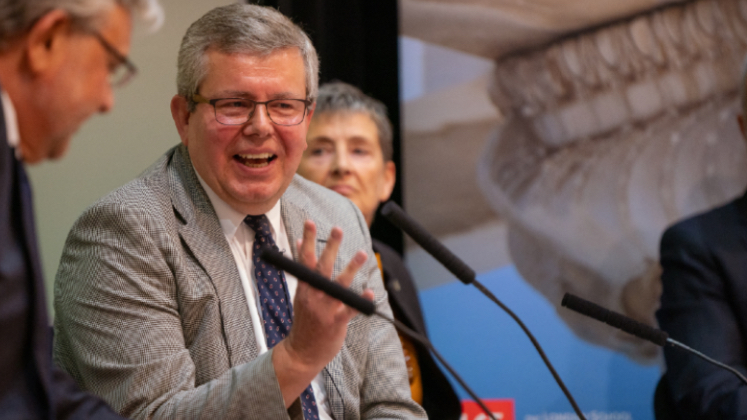
Q: When and how did you become a Greece aficionado?
I first started to follow events in Greece in the 1970s – after the Polytechnic uprising and after the transition to democracy. Soon there was the expectation of EU accession. This was a momentous period and, as students of politics with Greek classmates, we listened and learnt, especially as changes in Portugal and Spain followed. The election of 1981 was an obvious watershed and I was captivated by its politics and promise. I took tentative steps to learn more. The more I delved, the more there was to learn and I was very fortunate to have friends to help me. There are many things I admire about Greece and the Greeks, precious things not to be lost.
Q: What made you pursue the Eleftherios Venizelos Chair?
I was attracted to what could be done with the Chair and the Observatory. It’s a very special place: a platform for research and for discussion on a foreign country inside the LSE, a world class university. The HO could be a cul de sac or we could reach out and make connections to show our relevance and broaden the learning environment.
Q: What has been the greatest challenge throughout the years?
I’m going to use a boxing analogy: to ‘punch above our weight’. The staff and resources of the Observatory are few, but to show our relevance we need to act as if we’re bigger. Visitors are often surprised how small the HO is – we’re deceptive.
Q: Name a few of the most memorable moments at the Observatory.
I could never have imagined that we would host so many wonderful events: His All Holiness, the Patriarch, successive prime ministers, leaders of the opposition, prominent public figures and academics. It’s a long list over my 20 years here. There are private moments with each that will be a lasting memory. There were also one or two mishaps that I’d prefer to forget. The size and variety of the audiences has been great and I very much appreciate the intimacy of the Old Theatre at the LSE creating a close, shared atmosphere on these occasions. I really look forward to us being able to return to such events.
And, apart from one-off events, I will always treasure the ‘esprit de corps’ we’ve always had in the HO team. I could not have achieved 10% of what I have, without that support.
Q: If you could have dinner with a famous Greek person, dead or alive, who would it be and why?
If the meal had three courses, could I divide the guest list so I could talk, in turn, to Eleftherios Venizelos, Constantine Karamanlis, and Andreas Papandreou? I have so many questions and I’d be fascinated to learn more of them as individual personalities. All three would offer insights, but I think Andreas might be the most fun, yet perhaps the most enigmatic. And that’s how I got started with Greek politics really. Would I be pushing my luck if I asked for pre-dinner drinks with Lord Byron, as well?
Q: What would an -almost Greek- Englishman advise the Greeks?
Stay in the EU, avoid cricket and darts, and emulate the foreign universities many of you send your children to. You have so much more potential to realise. You’re in the right place, just make a better job of it... A more serious answer would need an article or a book. The social scientist in me focusses on structures and processes, so I’d readily engage in debates about improving domestic institutional quality – rather than putting faith in the charisma of the latest political ‘hero’ or convoluted conspiracy theories.
But I also wish the Brits could learn certain things from the Greeks as well. Like sociability, philoxenia, and support for family and friends for a start… Many of us enjoy Greece because it compensates for the failings we find in our homeland, so there are lessons to note. If only we had a professional bridge between our two societies, something we might call an ‘Hellenic Observatory’…
Q: Who inspires you the most?
I’ve been fortunate to learn from many people. From my student days, I’ve had incredible mentors and they set me on my way. In relation to Greece, I’ve found a very welcoming community of friends and scholars, patient and supportive. Rather than being dismissive or distant, they were inviting and supportive, as well as very patient. In my younger days, professors Thanos Veremis, Theodoros Couloumbis, and Richard Clogg were very encouraging. Those who came later are too numerous to mention, even though their influence has been just as great in many ways. I’ve benefitted hugely from my co-authors and HO colleagues. And, the more I’ve learned about Greece, the more I realise there is to know. My fascination is unabated and will remain with me. I’ve received far more than I could possibly have given.
As an academic, those I admire the most – in any context - are those who paint on a large canvas but maintain a richness of detail. And I’ve always prized those who paint with a fine narrative style – one that is accessible to as many as possible. I envy those who have written works that will last as valued references.